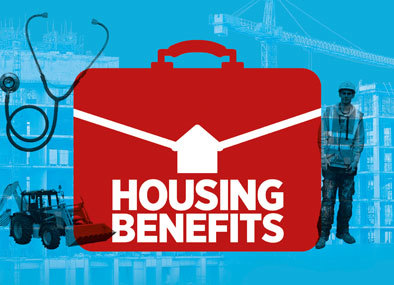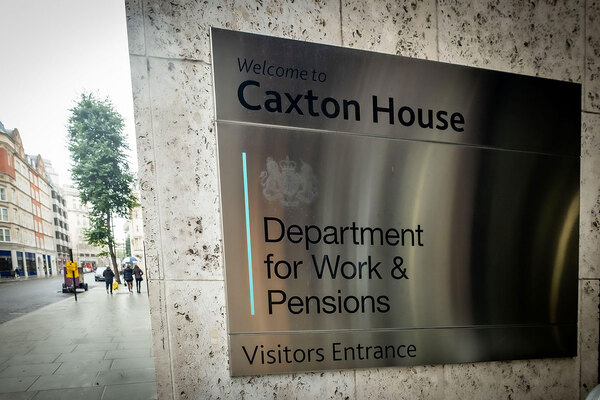You are viewing 1 of your 1 free articles
Why housing delivers
Inside Housing launches its Housing Benefits campaign today. Campaign editor Heather Spurr explains how it will shout about the sector’s importance
‘Where will our kids live?’ ask the placards held by some of the 2,500 campaigners who have joined the Homes for Britain rally in Westminster. Private developers, housing associations and campaign groups have come together on an overcast Tuesday to call for an end to the housing crisis. The event is described as the ‘biggest housing rally in a generation’ by the National Housing Federation (NHF). The body’s chief executive David Orr leads the charge with a rallying cry: ‘We’ve created a new sense of what we can do and what we’re capable of.’
The day after the rally, just a few streets down from where the crowds and placards were stationed yesterday, George Osborne is delivering his final Budget before the general election. The chancellor announces a new ‘Help to Buy ISA’ and a doubling of the number of housing zones outside London. But apart from these, announcements about housing are few and far between.
The optimism from the housing sector at the Homes for Britain rally quickly turns to gloom. David Montague, chief executive of L&Q, says: ‘At the rally, it felt like the tectonic plates had shifted. Politicians said they were committed to solving the housing crisis - that’s not what we saw in the Budget.’
It would probably have been a bit of a stretch for Mr Osborne to have reacted to Homes for Britain’s appeal just a day before his Budget last Wednesday. But for the sector, the lack of announcements for housing in the Budget was a symptom of the wider problem the rally had highlighted.
Social landlords say they simply do not feel that the government grasps the role of social landlords.
Eamon McGoldrick, managing director of the National Federation of ALMOs (NFA), says: ‘If you talk to health or public health officials, they understand the significance of housing, but unless it’s going to save them millions of pounds and they can see the cash tomorrow, they are not always receptive.’
Brendan Sarsfield, chair of the G15 group of London’s largest housing associations, says he previously asked Treasury and Department for Communities and Local Government (DCLG) officials why the government is investing £50bn into the High Speed Rail 2 project, but less and less on social housing. ‘It was clear that the transport lobby has very organised and well-researched data to support their case and housing doesn’t,’ he says.
Today, Inside Housing launches a new campaign that is aimed at strengthening the housing sector’s offer to government. Housing Benefits, which will run throughout the general election campaign and through to the Chartered Institute of Housing’s (CIH) Manchester conference in June, will spread understanding of the impact the sector has on housing, the economy and other key areas. It will help educate politicians and support readers to educate their local policy makers, stakeholders and the public.
In order to do this, the campaign has three targets (see box: campaign aims). First, we will deliver a series of housing prospectuses to government departments detailing the impact the sector has on health, crime, employment and the wider economy. We want the sector to broadcast the benefits and cost savings that social housing can provide to government departments.
The campaign will deliver a clear message: investment in good quality housing can provide important benefits and provides key cost savings, right from the Department of Health (DoH) to the Ministry of Justice (MoJ) to the Department for Work and Pensions (DWP).
We will pull together existing research in one place, with new details. There’s already some compelling evidence out there.
For example, a major study commissioned by the NHF in 2010, the Social Impact of Poor Housing, found that poor housing cost the National Health Service £2.5bn a year and causes children to perform badly at school. Findings from an online survey of tenants by the G15 and Frontier Economics published last September showed that 17% of tenants that had moved into a housing association home within the past year rated their health as much better than the year before.
Our second aim is to produce a ‘myth-busting toolkit’ that will examine some on the perceptions of social housing. Many in the housing sector argued last year that television programme Benefits Street did little to help the misconceptions about people living in social housing. What percentage of social tenants are in work? How much of public purse really goes on housing benefits? These are some of the questions we will ask as part of our campaign.
Our last aim is to help social landlords showcase the work they are doing locally by creating an online platform that will influence local authorities and MPs after the 2015 general election. We will be encouraging social landlords to upload their work on initiatives such as getting tenants into employment, providing homes that get people out of hospital quickly, and their role in shaping communities to help bring down local crime and anti-social behaviour. So let us know about the work you are doing to save the government money in your area.
Gathering reliable evidence is often difficult. The same Frontier Economics study commissioned by the G15 concluded that although living in a damp and mouldy house had been associated with poor health, ‘evidence can be inconsistent and causality is difficult to establish’. And Tom Murtha, chair of HACT, and former chief executive of Midland Heart, says local departments are hard to appeal to if councils’ spending is in ‘silos’.
But whatever the difficulties in gathering evidence and appealing to government, Tony Stacey, chair of Placeshapers, which represents more then 100 social landlords, says the housing sector is getting better at it. And located below the headlines in the Budget last week, there was a snippet of perhaps a greater cooperation between housing and the government. The Budget document said ministers would explore whether improving housing can reduce costs to the NHS.
So the Housing Benefits campaign is perhaps off to a head start. It already has the backing of the NHF, the CIH, the G15, the Northern Housing Consortium, Placeshapers, the NFA, HACT and SHOUT. So get in touch and get involved. We want to deliver for the housing sector throughout the general election campaign and beyond.
The campaign aims:
-Deliver a series of housing prospectuses to government departments detailing the impact the sector has on health, crime, employment and the wider economy.
-Produce a myth-busting toolkit that providers can use to challenge misconceptions about their work and their tenants.
-Create an online resource to help readers showcase the work they are delivering locally in order to influence local authorities and MPs
after the 2015 election campaign.
What the housing sector says:
Jo Boaden, chief executive, Northern Housing Consortium: ‘The Northern Housing Consortium is delighted to support Inside Housing’s “Housing Benefits” campaign… It is vital that we continue to make the case for housing in its widest sense and I know from our engagement with politicians and civil servants the impact that this evidence has on improving understanding of the significant contribution the sector makes.’
Eamon McGoldrick, managing director, NFA: ‘I don’t think the civil servants or the health professionals will listen without hard evidence. We’ll see whether we can start the conversations again with the new ministers but it’s not easy breaking into either the civil servants or ministers.’
Tony Stacey, chair, Placeshapers: ‘It is difficult to make progress but it is possible to make progress. [Placeshapers] had a round table a few months ago and all of us have made progress in collaborating with and influencing their local health and wellbeing agenda.’
Matt Leach, chief executive, HACT: ‘Regardless of who is in power after the election, we are going to face significant resource constraints in the public sector for the foreseeable future. Austerity isn’t going to go away. It’s unlikely that the purse strings are going to be suddenly opened to sectors, whether it is housing, education or health. We are all competing for a diminishing pot of public money and that makes the absence of evidence a weak point.’
Brendan Sarsfied, chair, G15, ‘We still need to carry on and fill in the gaps so we’ve got the real evidence of the effect that we are having on other social policy agendas. Social housing has become isolated from other social policy agendas. Homes are one of the cornerstones of life and we need to be articulating that better.’









